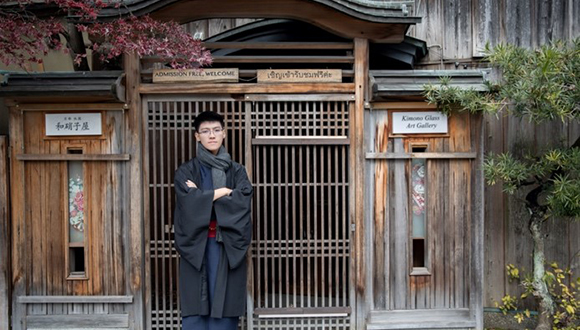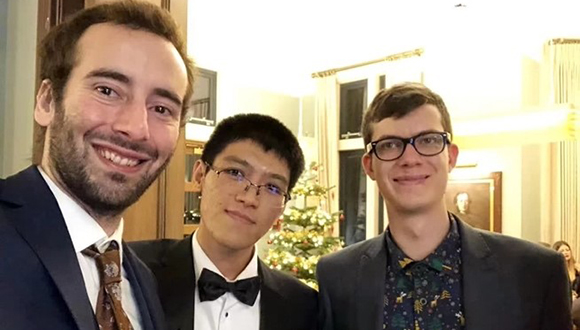Mon, 03 April, 2023
“In my childhood, I was always curious about the operational basics of machines in my daily life” said Bowei Li.
“I was lucky that both of my parents worked in mechanical fields. This helped me to experience things up close and witness how exciting engineering can be. It led me to today, joining the industry.”
When Bowei was a kid, his interest in mechanical engineering began with questions asked by his parents, such as “do you know how the car works?” or “how do these toys work?” These kinds of inquisitive questions that can come-up in conversation during a morning ride to school, or at home, especially when your parents are a Professor in engineering and a technical director at an automotive company.
Bowei’s innate interest in the practical application of mechanical engineering resulted in an exceptional educational journey. In 2017, he completed his Bachelor of Engineering in Mechanical Design, Manufacturing, and Automation from Xi'an University of Science and Technology. During his Bachelor's, he participated in the China Undergraduate Mathematical Contest in Modelling (CUMCM) and won 2nd prize. He received the Brunel International Excellence Scholarship in 2019 and enrolled in a Masters of Engineering programme. That same year he joined in the NSIRC PhD programme, working on a TWI Core Research Programme (CRP) project, for which his doctorate was awarded in 2022 by Brunel University London.
Talking about his industry focused PhD experience at NSIRC, Bowei said, “The Industrial PhD provided me with an insightful research experience, closer to the practical application of engineering by working directly on an industrial project that solves real world problems. It also helped me to showcase my professional abilities through the project.”
Research Work: Experimental & Numerical Studies of Laser Riveting for Dissimilar Materials Joining
The use of dissimilar materials is common in the automotive and aerospace sectors because of the performance and lightweight features it offers. For dissimilar joining, the most commonly used methods are mechanical fastening (riveting and bolting) and adhesive bonding. However, these methods have limitations in specific conditions. Therefore, laser riveting has been developed as an innovative technique, which aims to improve process flexibility and productivity compared to traditional methods.
Paola De Bono, Section Manager for Laser and Sheet Processes Section at TW, and Bowei’s PhD Industrial Supervisor said, “Bowei’s excellent PhD work could constitute a very innovative and effective step change for joining dissimilar materials.”
“One major challenge currently faced within the manufacture of automotive and aerospace components is producing lightweight multi-material components, which can be easily recycled at end-of-life. Existing methods in use for joining dissimilar materials, such us mechanical fastening and adhesive bonding, are significantly limiting the uptake of dissimilar material combinations in the transportation sector, because they often add extra weight, costs or hinder disassembly and recyclability.”
 Bowei Li joined the NSIRC PhD Programme after his Masters at Brunel University. Photo: Bowei Li
Bowei Li joined the NSIRC PhD Programme after his Masters at Brunel University. Photo: Bowei Li
Bowei’s research focuses on creating an advanced rivet joint for hybrid materials using laser wire-based additive manufacturing. These laser riveted joints were then evaluated through mechanical and thermal analyses. This innovative joining technique can achieve a higher-level efficiency and strength compared with the traditional mechanical and adhesive joining technologies.
The study has helped industries including aerospace and automotive, by providing a more efficient and cost-effective way to create durable, high-performance joints that can withstand the rigours of real-world use, while being flexible in terms of geometrical shapes and structures.
Published Research & Impact
During his PhD, Bowei presented his research work at The 2021 Industrial Laser Applications Symposium (ILAS) in the UK and the 40th International Congress on Applications of Lasers & Electro-Optics (ICALEO) in the U.S. The research was also published in an impact fact journal titled the Journal of Laser Applications.
First Step on the Road of Engineering
Right after completing PhD in 2022, Bowei started working as a Senior Mechanical Engineer at ASM and plans to continue working on mechanical and thermal research, practising experimental and simulation skills in the high-tech industry.
“The project management and development skills I learnt in the past three years, during my doctorate, helped me to quickly adapt to my new engineer role at ASM" said Bowei. "In a nutshell, the engineering and research skill I gained from TWI will benefit my whole career in the future.”
 Bowei (centre) with fellow NSIRC PhD students. Photo: Bowei Li
Bowei (centre) with fellow NSIRC PhD students. Photo: Bowei Li